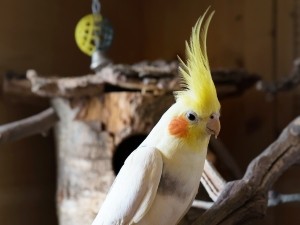
Vomiting in your pet cockatiel is highly irregular, vomiting blood in your pet cockatiel is even more irregular, and you’d be right to be concerned
If your pet cockatiel is vomiting blood this article will be of help to you
Table of Contents
Cockatiel vomiting blood:
Vomiting in humans is something to worry about, the same is true for your pet cockatiel, this is why this may be happening to your bird:
Swallowed a sharp object:
You’re likely giving your pet cockatiel feed that has been designed for the bird and is safe from any sharp objects that may injure the bird.
However, your bird may be curious and eat something that could injure it when you aren’t around
Things that can injure your cockatiel if eaten include the broken shells of nuts, nails, screws, and pins found in your bird’s environment.
Because these objects are very shiny they will be very attractive to your bird and the bird may eat them out of curiosity.
If eaten, the sharp object may cut up and damage parts of the bird’s digestive tract and this can cause the bird to start to either vomit blood or poop blood.
A bird with an injured digestive tract may not only start to vomit blood, the bird may also develop sepsis if an infection develops at the wound site, this can result in severe bleeding and even death.
What to do:
Taking your bird to the vet is the recommended course of action in this case, the vet will be able to examine the bird and perform surgery on the bird to remove the object.
You can keep this happening in the future by using a magnetic sweep in the bird’s cage to keep metallic sharp objects at bay also use the magnetic sweep wherever your cockatiel may roam around.
Infectious Laryngotracheitis:
This is a viral infection that can affect a variety of bird species including cockatiels and it may be the reason why your bird is vomiting blood.
The disease is caused by a herpesvirus and is transmitted when healthy birds come into contact with infected birds.
The disease can also be transmitted if a healthy bird comes into contact with contaminated housing, bird tissue, humans, other animals, or contaminated dead birds.
Signs of this condition in your bird, apart from the bird vomiting blood, include coughing mucous, wheezing, watery eyes, watery discharge from the nostrils, gasping breath, coughing, and sneezing.
What to do:
The vet will be able to properly diagnose your bird if it has this condition so getting your bird to the vet is a must.
Unfortunately, there is no specific treatment for this infection, which is the case for most viral infections, however, the bird can be treated for any secondary bacterial infections it develops while having Infectious Laryngotracheitis.
If your bird does have a secondary bacterial infection then antibiotics will be given if your bird as a treatment for the secondary infection.
You can however give your bird plenty of clean water to drink and plenty of nutrient-rich foods to eat to help the bird recover on its own,
Also, making sure that the bird has access to good ventilation will help with recovery
If you enjoyed this article then you may also be interested in other bird related articles. Here are some articles that you may be interested in: My Bird Is Throwing Up Clear Liquid, Why Is My Bird Throwing Up Water, Baby Pigeon Not Flying Away, Cockatiel Not Digesting Seeds, Parrot Falling Off Of Perch At Night

